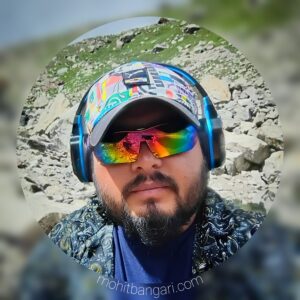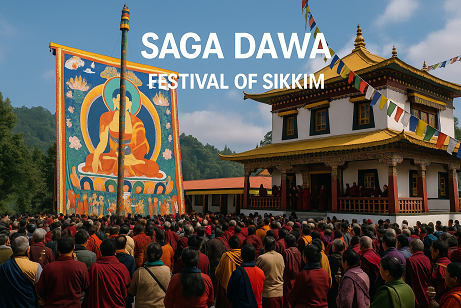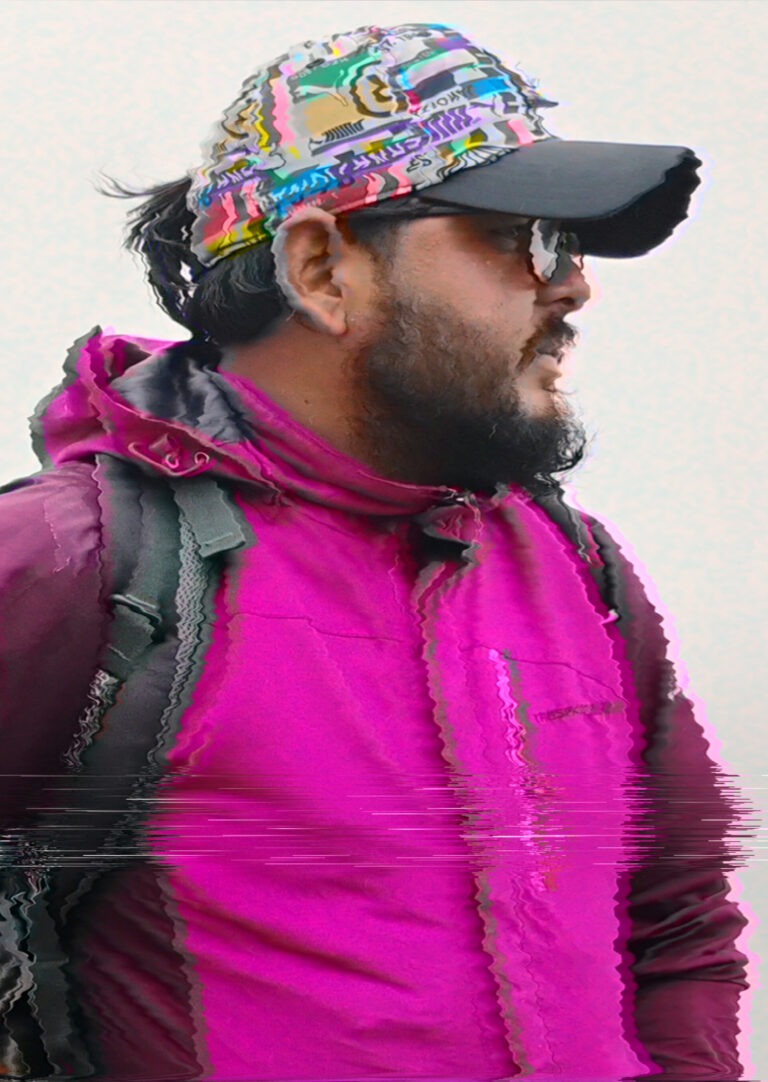By – Mohit Bangari
24 July 2025

Explore Himalaya With Me!!

Saga Dawa Festival is one of the holiest and most spiritual festivals in Sikkim, deeply rooted in Mahayana Buddhism. The month of Saga Dawa, which falls on the fourth month of the Tibetan lunar calendar (mostly in May or June), is known as the ‘Month of Merits’. This sacred time celebrates three major events in Lord Buddha’s life —
👉 His birth,
👉 His enlightenment, and
👉 His Mahaparinirvana (death or final liberation).
The entire month is filled with prayers, offerings, fasting, acts of kindness, and pilgrimages. But the 15th day, known as the Saga Dawa Düchen, is the main day when all three events are believed to have occurred.
In Buddhist belief, any good or bad karma gets multiplied during Saga Dawa —
🪔 Good deeds = 100,000 times more merit
⚠️ Negative actions = 100,000 times more impact
That’s why people avoid killing insects, eating meat, lying, or hurting others.
They focus on doing more punya (meritorious acts) like:
Donating to the poor
Freeing animals and birds
Visiting monasteries
Circumambulating stupas and chortens
Lighting butter lamps
Reciting mantras (especially “Om Mani Padme Hum”)
This month reflects the core teachings of Buddhism – compassion, simplicity, and selflessness.
The celebration starts with rituals in monasteries like Rumtek, Enchey, Pemayangtse, Tashiding, etc.
Lamas perform pujas, chanting, and sacred dances, and Gur Bum readings (100,000 prayers) are recited.
On Saga Dawa Düchen, a grand Thangka (Buddha scroll painting) is carried around in a procession.
Devotees follow, reciting prayers and carrying prayer wheels, butter lamps, and incense.
In places like Do-Drul Chorten (Gangtok), you’ll see hundreds of people circumambulating the stupa clockwise, spinning prayer wheels and whispering mantras.
This unique practice is called ‘Tsethar’, where people buy and free birds or fishes as a symbolic act of compassion.
Locals offer alms, food, money, clothes, and essential items to monks and needy people, especially in remote villages.
Most important place during Saga Dawa in Sikkim.
You can witness massive processions, butter lamp lighting, and ancient rituals.
Monks chant continuously throughout the day.
Famous for long queues of devotees doing pradakshina (circumambulation).
Decorated with prayer flags and lamps during the festival.
Quiet but deeply spiritual celebration.
Monks here chant sacred texts for days.
Saga Dawa is also connected with local Lepcha and Bhutia beliefs.
Elders tell stories of past life deeds and encourage children to be humble.
People stop eating meat for the whole month — even street vendors avoid selling non-veg. It’s seen as a month of purification, not just for the body but also for the soul.
✅ Respect the rituals – Don’t interrupt the prayers or click flash photos inside monasteries.
✅ Dress modestly – Prefer full sleeves and covered legs when visiting monasteries.
✅ Be vegetarian for a day – Try the local veg dishes like thukpa, gyathuk, and phagshapa without meat.
✅ Participate – Spin prayer wheels, light a butter lamp, or donate food. Locals love when visitors join respectfully.
✅ Wake up early – Most rituals start early morning, around 5–6 AM.
Month: May or June (based on Tibetan lunar calendar)
Saga Dawa Düchen (main day): Changes every year. In 2025, it will be on June 10 (tentative).
Always check with local monasteries for exact dates.
Sel Roti (Sweet rice doughnuts) – popular during fasting
Tingmo with veg stew – local steamed bread
Buckwheat noodles
Butter tea (po cha) – must-try during early morning rituals
Losar – Tibetan New Year
Pang Lhabsol – Dedicated to Mt. Kanchenjunga
Drupka Teshi – Celebrates Buddha’s first teaching
You can check my other blog post on these soon!
The Saga Dawa Festival of Sikkim is not just a celebration, it’s a deep spiritual experience. In this peaceful month, the whole region echoes with prayers, incense, and kindness. Whether you’re a spiritual seeker or a culture lover, attending Saga Dawa can touch your soul deeply.
If you’re planning a trip to Sikkim, try to visit during Saga Dawa month — you’ll experience the true heart of Buddhist Himalayas.
👉 Have you already read my detailed travel guide on Gangtok? Check it out here:
🔗 Gangtok – A Detailed Travel Guide & Some Tips
You can also explore more on Himalayan treks like Darma Valley, Adi Kailash, and others on my website mohitbangari.com, where I share full guides, routes, permit tips and cultural info.
By – Mohit Bangari
24 July 2025
Do you know about Ramman festival of Salud-Dungra village? It’s one of the intangible world cultural heritage of India in UNESCO. You can read a detailed article on this topic here.

Explore Himalaya With Me!!


Explore the beauty and cultures of the Himalayas, from Jammu and Kashmir to Arunachal Pradesh, Tibet and Nepal. My blog shares stories, pictures, and fun articles about this amazing region. Come along on a journey where each mountain has a tale and every valley hides a treasure. Join me as I discover the magic of the mountains together.
Welcome to my Himalayan Adventure!